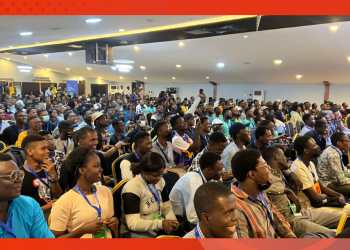Digitalisation came with the twenty-first century and never left. Everything slowly started blending together. The clothes. The jokes. Even the language. Gen Z’s all over the world sound the same, and it does not even feel strange anymore. That is what the internet does. It makes the world feel like one big group chat.
But somewhere inside all that sameness, countries started losing the small things that made them, them. Language is usually the first to go. So when Benin announced “JaimeMaLangue”, it felt like a reminder that modern life does not have to erase culture. They are moving forward with technology, but they are taking their identity with them.
What Is JaimeMaLangue?
JaimeMaLangue is a national initiative launched in Cotonou on 10 November 2025. The idea is simple. Beninese citizens visit the platform jaimemalangue.bj, record short voice clips in their mother tongue and submit them. Those recordings become training data for artificial intelligence models that can understand and generate local languages. Reporting notes that it is part of a bigger plan to make sure Benin’s languages show up in the digital future, not just in history books.
The project is led by the Agence des Systèmes d’Information et du Numérique in partnership with the Institut IIdiA. They launched it under the theme “Benin Speaks to the Future,” which fits perfectly. Because this is not only a tech project. It is a cultural one.
How It Works
The platform itself is very straightforward. You go on the site, read a sentence out loud and upload your voice. That is it. Every recording becomes part of a growing dataset that will help train AI systems to recognise and respond in Beninese languages.The pilot phase is starting with Fongbé, one of the country’s most widely spoken languages.
More languages will follow. The plan is to include Yoruba, Baatonu and others as the project expands. Each voice clip brings the AI a little closer to actually understanding the people it is supposed to serve. That is the whole point. AI should not only respond to languages with the biggest global reach. It should also respond to the languages that hold people’s identity.
Why This Matters For Benin
This project is not appearing out of nowhere. JaimeMaLangue fits into Benin’s National Artificial Intelligence and Big Data Strategy, adopted in January 2023. The strategy focuses on building local capacity, improving digital accessibility and making sure technology reflects the country’s real population.
Language is a big part of that. Many Beninese citizens speak their mother tongue more comfortably than French, but digital platforms rarely support these languages. If AI becomes part of everyday life, people who do not speak global languages could be left out. JaimeMaLangue tries to avoid that by building AI systems that meet citizens where they are, not where the world expects them to be.
It is also a preservation effort. Languages disappear when they stop being used, written or recorded. Benin is choosing the opposite approach. They are putting their languages into the future instead of letting them fade quietly into the past.
The Bigger Picture
Across Africa, there is a quiet but important conversation happening about language in technology. Most global AI systems understand English, French or Chinese long before they recognise an African language. It is not because those languages matter more. It is because they have more digital data. Without enough voice samples, text and recordings, AI cannot learn.
Benin is choosing to fix that problem early. JaimeMaLangue is a small project, but it speaks to a larger movement. Countries like Nigeria, Senegal and South Africa have started exploring ways to bring their local languages into AI too. Everyone knows that if African languages do not show up in the datasets, they will not show up in the digital future.
What Benin is doing is simple. They are not waiting for global tech companies to prioritise their languages. They are building the datasets themselves.
Takeaway
Benin is showing that culture and technology can move side by side. The country is embracing AI, but it refuses to let its local languages disappear inside the process. JaimeMaLangue is a reminder that modern life does not have to flatten everything. People can keep their identity and still participate fully in the digital world.
It is a small idea with long-term impact. Every voice clip is a tiny piece of heritage sent into the future. And if everything goes as planned, AI systems built years from now will still be able to understand the languages that shaped Benin.
















